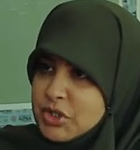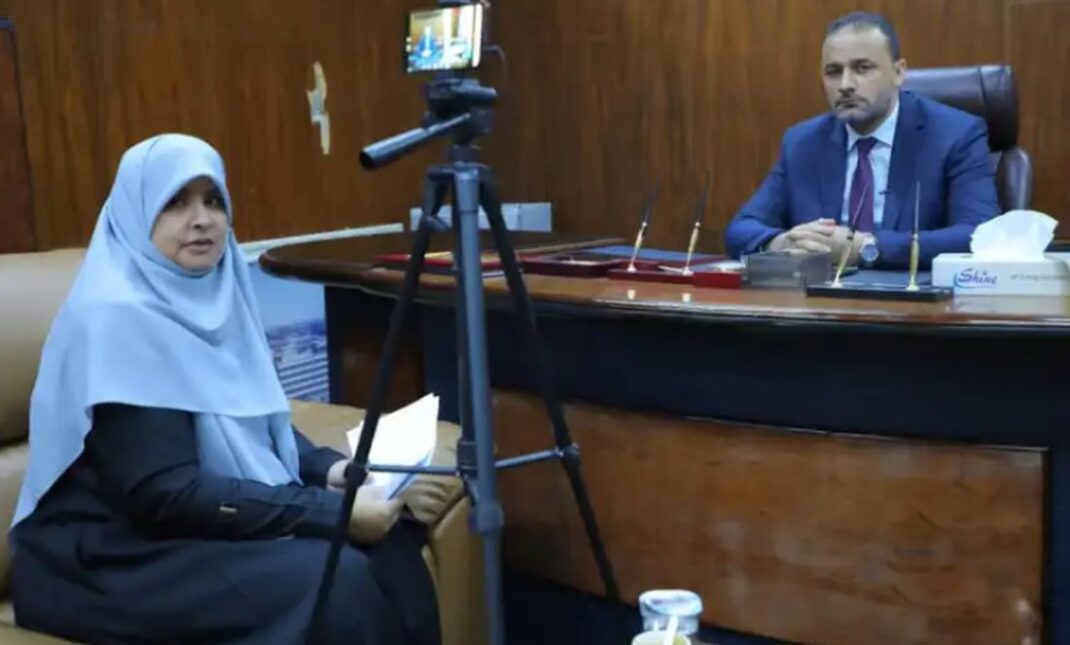Ibtisam Ighfir

Libya’s University of Benghazi was the highest-placed of only three Libyan universities included in the QS Arab Region University Rankings 2023. Its president, Ezzedine Younis Al-Darssi, regards that as a triumph attesting to the university’s efforts to maintain quality despite the challenges it faces in an unstable country.
Al-Darssi, who has led the prestigious institution since 2019, recently talked to Al-Fanar Media about this achievement.
Al-Darssi said that since he became president of the nearly seven-decade old university, he established a ranking unit affiliated with the university’s International Cooperation Office to help the university advance academically and raise its international profile.
He added: “We have sought, from the beginning, to be included in the QS Rankings, which is one of the most important in the world, because it focuses on scientific research, the university’s academic reputation, and the reputation of its graduates.”
Al-Darssi said that being included in this prestigious ranking, produced by the British higher-education analytics company QS Quacquarelli Symonds, goes in line with the university’s achievements in other areas as well, such as the hiring of its graduates by major international institutions, such as CNN, Facebook, and Google.
The university was first ranked in 2021, when its leaders received an honour from QS Quaquarelli Symonds at a conference in the United Arab Emirates.
The University of Benghazi, like other academic and research organisations, suffered severe physical damage during the worst of the fighting between forces vying for power in Libya since the ouster of Muammar Gaddafi in 2011.
Although a relative calm prevails now, the university is still coping with the damages. Its administration has remained without a headquarters for the past six years, Al-Darssi said, and many of its scientific centres and laboratories suffered severe destruction. “The damage affected about 85 percent of the facilities,” he said. “They are still in ruins.”
The physical toll, along with the country’s continuing political and financial turmoil, have hindered the majority of university faculty members from delivering the expected required research. Still, many researchers have managed to submit scientific papers for publication, Al-Darssi said.
He explained that the university administration decided to focus on research, despite the lack of state support. “Publishing in scientific journals is very expensive. It sometimes cost 1,000 U.S. dollars, which is equivalent to about 5,000 Libyan dinars,” he said. “This equals the salary of a faculty member or more.”
Amid such challenges, the university has asked faculty members, in cooperation with the ranking unit, to take steps like registering on websites like Google Scholar and ResearchGate that index professors’ research, making it more visible internationally and increasing their opportunities to network with other scholars. In addition, a technical team at the university worked for nine months to update the university’s website and fill out forms that provide detailed and accurate data to ranking organisations.
The university has also suffered financial difficulties since 2011, Al-Darssi said. He noted that it serves not only the city of Benghazi but a whole region from the neighboring Al-Marj district to Kufra, 1,000 kilometres to the south.
“The university’s budget used to be about 250 million Libyan dinars annually. Today it does not exceed 18 or 20 million dinars. That’s for a university with 90 percent of its facilities destroyed,” he said. “I hope our university will receive the attention of Libya’s executive authorities.”
Hopes of Starting New Ph.D. Programmes
Al-Darssi also talked about the role the University of Benghazi could play in Libya’s programme to domesticate postgraduate studies, and doctoral studies in particular, so more students can complete their studies at home.
He said the university was unable to launch Ph.D. programmes in some disciplines now because of regulations and laws that require the presence of five working, non-retired, faculty members with the title of associate professor or professor.
Some departments have 10 to 15 members with the rank of associate professor, he said, but most of them are retired.
He hopes that the Ministry of Higher Education will address this point by allowing retirees to be granted the title of “honorary professor” and continue their work. In this context, the university has established an agency for postgraduate studies and training that specialises in postgraduate programmes only.
Asked whether the lack of five working professors in university departments was related to sending students abroad to complete their postgraduate studies, Al-Darssi said that many students do not wish to enroll in postgraduate studies in local universities.
“I say it, with regret and frankness, that the state is currently unable to send students abroad, given that over 10,000 students have already got a scholarship. The number is alarming and large,” he added. “I hope these students, especially those whose majors are available in universities at home, will enroll in studies in Libya and be of help to their universities and cities.”
After the controversy that accompanied the World Economic Forum’s decision to omit Libya and five other Arab nations from its Quality of Education Index, Al-Darssi said the University of Benghazi was working towards achieving development and international accreditation.
The university is starting with the Faculty of Medicine, which is working to approve new curricula in line with international accreditation standards, he said. “Any educational institution that does not meet these standards will have only local accreditation, and its graduates cannot study or work outside Libya,” he said. He added that the medical school was “racing against time” to meet these criteria before the end of 2023. “The college must have this accreditation.”
Al-Darssi said he had sought advice from Egypt’s National Authority for Quality Assurance and Accreditation of Education on this issue and had signed a cooperation protocol to help the university obtain this accreditation.
_____________





